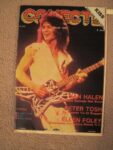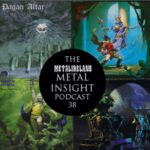- 🚀 Copy short link
- 🔙 Back to Media
- « Weird Tales | Cirith Ungol Interview with Robert Garvin- Rat Salad Review Episode 109 »
- ⚠️ Add, Edit or Remove your item
- 🔍 After 50 Years of Metal, Cirith Ungol Bid Farewell (For Now) (DuckDuckGo search or Google search or WP search or FB)
At the end of their current tour, Cirith Ungol will walk away from the live stage, more than 50 years after their first show and nearly a decade since their first reunion gig. It won’t be their first retirement, but when they called it quits in 1991, there was no farewell tour. It’s possible that nobody would have shown up if there had been one. The Ventura, California band’s thunderous, grandiose metal was out of step with everything going on in heavy music at the time, from the Sunset Strip hair metal scene that still held dominion just down the 101 to the emergent grunge boom in Seattle. On their initial run, Cirith Ungol had to settle for being the ultimate cult heavy metal band—known by a select few, beloved by even fewer.
“Back in the day, nobody really wanted to hear what we were doing,” vocalist Tim Baker says. We’d done four albums, really, with no progress getting anywhere. The records were out there, and a certain small niche of people had heard of us and liked them.”
Those four records—especially 1981’s Frost and Fire and 1984’s King of the Dead—are widely considered classics today. With their sophisticated melodies, doomy atmosphere, sword-and-sorcery lyrics, and Michael Whelan-painted album covers, Cirith Ungol were early progenitors of the subgenre that would become known as epic heavy metal. That put them on a stylistic island, especially in America. “We were outcasts, in a way,” Baker says. “We were too extreme for people. Mainly, that was my fault.”
Baker’s idiosyncratic vocals serve as Cirith Ungol’s calling card, and they’re, indeed, an acquired taste. He’s not a conventionally gifted singer, like Iron Maiden’s Bruce Dickinson or Judas Priest’s Rob Halford. Still, what he lacks in technicality, he makes up for with a surfeit of personality. His helium-rush head voice constantly strains at its shackles, and his deeper range feels muddied and gruff. He likes to end lines with an uptalk-y inflection: “Come on and RIDE / The black ma-CHINE!” Baker’s voice is the first thing that jumps out when listening to Cirith Ungol, and for plenty of less adventurous metalheads, it was a dealbreaker. But it has a way of sneaking up on you.
“When we put out Frost and Fire, we’d sit there every night and read our fan mail,” drummer Robert Garven recalls. “One guy wrote, ‘I just hate your singer, man. I like your band, but I hate your singer. It’s just horrible.’ And then the next week, we got another letter from him: ‘I still hate your singer, but it’s not that bad now.’ And then, finally, he wrote a letter that said, ‘You guys are my favorite band of all time.’ I think some music, you can listen to right off the bat and fall in love with it. Our music, and we understand this, we’re putting out stuff that’s a little more difficult for people to consume. We had no illusions that we were doing anything otherwise.”
Cirith Ungol never hit their commercial stride in the ’80s, and after the release of 1991’s Paradise Lost, everyone except Baker and Garven quit the band. They formally broke up shortly after that. Baker retreated into family life and a regular job; Garven bought a Ferrari. (“I was working a regular job, too, to support the Ferrari,” he says with a laugh.) Neither of them continued playing music, not even in private. They’d occasionally get asked about putting the band back together but always politely demur. Garven likens it to asking a retired athlete to compete again: “If you’re an Olympic swimmer in your 50s, and someone said, ‘Hey, have you ever thought about swimming in the Olympics again?’ That ship’s already sailed.”
It took the urging of a fellow Ventura native to make Cirith Ungol seriously consider reuniting. Jarvis Leatherby, a co-founder of the old-school metal revivalists Night Demon, grew up in the same Southern California community as Baker and Garven. “They were a generation or two ahead of us,” he says. “It’s funny, the first album, Frost and Fire, they pressed themselves. It goes for at least 100 bucks on eBay. When I was growing up, they were in the dollar bin in every thrift store in town.”
Leatherby was a late-blooming Cirith Ungol fan—he says the vocals were too weird for him as a kid—but they became a source of civic pride when he took Night Demon on tour in Europe. “I was traveling the world and seeing how many people actually loved Cirith Ungol. It was insane,” he says. He started sending dispatches home to Ventura, trying to persuade Baker and Garven to reconsider: “It was emails, text messages, phone calls, pictures of people with tattoos, merch, all this stuff, going, ‘Hey, look, there is an audience here.’”
The first steps were tentative. Baker, Garven, guitarist Greg Lindstrom, and bassist Michael “Flint” Vujea sat for an autograph session at the 2015 edition of Leatherby’s Ventura festival, the lovingly named Frost and Fire. (Manilla Road, perhaps Cirith Ungol’s only true U.S. contemporaries in the early days, headlined the fest.) “We did this sit-down meet and greet, and people brought albums and memorabilia and photos and stuff,” Garven says. “I’m not sure how long we signed for. An hour, maybe two hours. It just kind of blew us away.”
That signing session was the proof of concept that Baker and Garven needed to get the wheels of Cirith Ungol slowly turning again. It started with a series of loose, impromptu jam sessions at Night Demon’s rehearsal space. Garven needed time to get his chops back after setting down the drumsticks for nearly 25 years; Leatherby charitably describes overhearing his initial attempts at playing the old songs as “like listening to Animal from The Muppets.” Guitarist Jim Barrazza, who played on Paradise Lost, came back into the fold. Vujea couldn’t make the logistics work, so Leatherby stepped in on bass. (He also became their manager.) Baker stood in the corner of the room, watching the band reinterpret the Cirith Ungol catalog as instrumental music.
“Every time we would jam, Tim would come, but he’d refuse to sing,” Leatherby recalls. “He’d say, ‘I’m not doing this. I’m just hanging out [and] having a good time watching you guys.’ One day, we were playing ‘Frost and Fire,’ and we couldn’t see him. And he just started singing. And we were like, ‘Holy fuck,’ because the voice was there.”
Cirith Ungol played their first show since their 1991 breakup at the 2016 edition of Frost and Fire, burning through a set that covered all four of their classic albums. It was especially meaningful for the band to make their comeback in Ventura, the hometown that hadn’t quite known what to make of them for all those years. A short run of festival dates in the U.S. and Europe followed in 2017.
“We thought we’d play a couple of shows and that would be it,” Garven says. “Kind of just a fun thing, a small reunion. But then, as we started playing the shows—We’re musicians, right?”
Plenty of band reunions offer a few nostalgia-baiting live sets and little else. If a new album does materialize, it often fails to recapture the magic of the old stuff. Happily (if unexpectedly), Cirith Ungol’s second act has yielded some of their finest music—the standalone single “Witch’s Game,” the Half Past Human EP, and a pair of full-lengths, Forever Black and Dark Parade.
“I love everything that we’ve done, but I’m still really impressed with the latest stuff that we’ve done because we’re the senior citizens of heavy metal,” Garven says. “If you’re gonna do new material, it needs to stand side by side with your earlier material. And I think we’ve surpassed that.”
Forever Black and Dark Parade are also the darkest, doomiest albums in the Cirith Ungol discography. There’s still plenty of sword-and-sorcery material, taking inspiration from authors like Michael Moorcock and Fritz Leiber. But there’s also an increasingly urgent undercurrent of societal critique and apocalyptic warning—maybe an unsurprising development for a band who had one of their first shows at a Vietnam War protest, broken up by riot cops.
“I don’t know if you watch the news ever, but we’re kind of heading off a cliff, environmentally, politically, socially,” Garven says. “We’re not heading towards a beautiful sunset where everyone’s dancing and happy. So a lot of our music, especially the lyrics Tim’s been writing, is really dark. I think we wish we could write happier songs, but we’re a product of the environment that we’re living in.”
Impending civilization collapse aside, Cirith Ungol’s reunion era has been the busiest, most blissful stretch of their career. A robust trad-metal ecosystem has popped up in the past decade, with a new rash of old-school-minded festivals selling huge numbers of tickets across North America and Europe. Cirith Ungol helped build that ecosystem, headlining nearly all of those fests in the years since their return. But as the principal members inch closer to their 70s, they’ve decided that it’s time to hang it up again. “We’re getting older, and some of us are having some health issues, so this is the last year of us touring,” Garven confirms. This time, fans will have the chance to say goodbye.
I caught the Cirith Ungol farewell tour in March, at the Hell’s Heroes festival in Houston. They played in the middle of the day under a blazing sun, which only supercharged the sweaty physicality of songs like “Atom Smasher” and “I’m Alive.” As the set wore on, I found myself getting strangely emotional. The Hell’s Heroes lineup is dotted with bands who likely wouldn’t exist without Cirith Ungol’s influence, and there they were, playing with the same eccentricity and intensity that made them outcasts in the ’80s. Here, now, they get to play to thousands of people who revere them as gods. Through patience, persistence, and a little luck, Cirith Ungol are the conquering metal heroes they should have been four decades ago. By the time they played their stirring, set-closing rendition of “Join the Legion,” I realized I wasn’t ready for it to end. I’m now planning on seeing as many more Cirith Ungol shows as I can.
I’ll have plenty of opportunities. This year’s touring schedule is the most intense in Cirith Ungol’s long history. “Frankly, I think I’m probably gonna burn them out,” Leatherby says. “There’s a lot of stuff happening that they’ve never experienced yet. There’s a lot of travel, a lot of back-to-backs, and they’ve never done that in their career.”
Garven accepts that this is the last year Cirith Ungol will be able to do a full-on, pedal-to-the-metal tour. It’s a farewell, but he insists it’s a farewell with an asterisk. He wants to leave the door open a crack for the occasional one-off gig. He especially hopes the band can still make new music.
“This is our last year of touring, like what we’re doing, playing a lot of shows in a row,” he says. “At our age, we’re near the end. But boy, if you listen to Dark Parade, I think it’s the best album we’ve ever done. Tim feels the same way, and we just cranked that out recently. And there’s no doubt in my mind we could do another one like that, or even heavier.”
Cirith Ungol farewell interview

